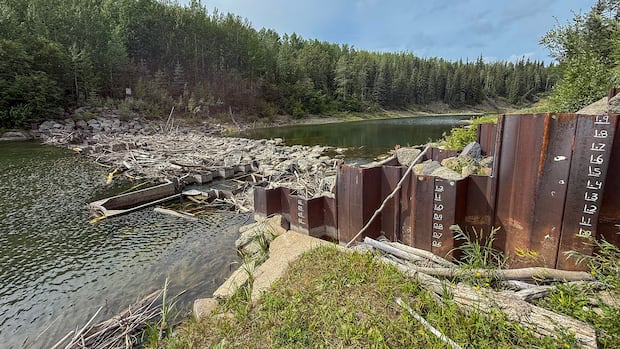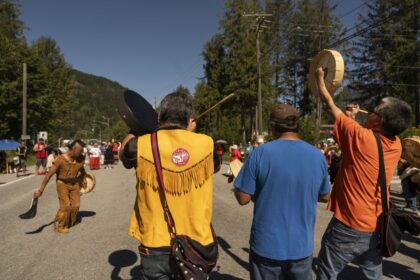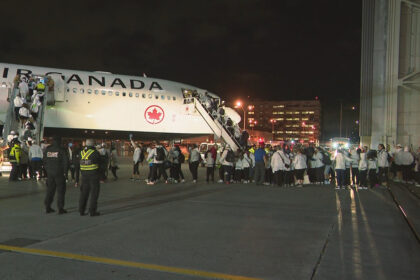British ColumbiaCurrently, the city draws drinking water from the Kiskatinaw River. But it has dropped to record lows, leaving the B.C. city looking to connect with a larger river, further afield.B.C. city must consult with Treaty 8 First Nations, landowners and general publicTom Summer · CBC News · Posted: Oct 11, 2025 1:00 PM EDT | Last Updated: 5 hours agoView of the Kiskatinaw River weir at Arras on Aug. 9, 2025. This is where the City of Dawson Creek intakes its domestic drinking water supply. (Matt Preprost/CBC)Dawson Creek residents got a chance to speak their minds about a $100-million water pipeline proposal at an open house on Oct. 8.The pipeline seeks to address the city’s local water shortage, caused by a four-year drought in the South Peace region.Currently, the city, and others in the region, draw drinking water from the Kiskatinaw River, about 10 kilometres west of Dawson Creek. But it has dropped to record lows, leaving the city looking to connect with another water source, further afield: The Peace River near Taylor, B.C., about 50 kilometres northeast.The proposed pipeline would be built using an existing pipeline corridor.Consultation for the project is required with Treaty 8 First Nations, landowners within the water line corridor, and the general public. “It’s a well-documented drought, it’s not a surprise. I think any person worth their own salt could have predicted that the [Kiskatinaw] river was going to continue to decrease,” said Theran Bassett, a father, who grew up in Dawson Creek. Bassett says he wants stricter regulation of industry water use and feels the water pipeline should be paid for by those users. “I know oil and gas are really important to our area, but I do know they’re a water hog,” Bassett said. “Why do we keep licensing more and more water rights to industry when, clearly, this drought is getting more and more severe?”Residents worriedCity of Dawson Creek Mayor Darcy Dober said he was pleased with the steady flow of residents at the open house.“I think it’s critical that we look at getting a secure source for our community,” he added. The proposed pipeline would also serve the neighbouring Village of Pouce Coupe. Its former mayor Joe Judge says the water pipeline is a timely solution to the drought and a project the community should move forward on. “At the end of the day, we need water or we don’t survive. So, we have to look at the best way of getting that and doing it as quickly, but as proper as we can,” Judge said. West Moberly First Nations member Clifford Gauthier attended to learn about possible impacts to traditional land, gathering information for the Kelly Lake First Nations Society. Gauthier recalled the days when water pipelines weren’t needed.”There was a time then we could drink water anywhere. In the mountains, any place that we went to, the water was plentiful. Now as time’s gone by, there’s droughts, water is less and less,” said Gauthier.Grace Prier, 93, has lived in Dawson Creek since 1950 and says she’s concerned about running out of water, especially with the new hospital under construction. “Because I’m older, I guess, and I’m more aware of how dire the situation could be. I don’t know if the younger generation really grasps it,” Prier said. The city’s next steps are to secure an exemption from the Environmental Assessment Office (EAO), and to wrap up the public comment period with a virtual session on Oct. 23 for those who missed the open house. The exemption is being sought to cut a five-year approval process down to two, fast-tracking the new water source. Any major projects like the pipeline require approval by the EAO, a regulatory agency within the provincial government.ABOUT THE AUTHORTom Summer is a reporter for CBC News in Fort St. John. Born and raised in the Peace Country, he previously reported for the Alaska Highway News, covering community issues, courts, municipal politics, and Site C, while travelling across Northeast B.C. working on the traditional territory of Treaty 8 First Nations. You can reach him at tom.summer@cbc.ca
With water running low, Dawson Creek residents weigh in on $100M pipeline proposal











